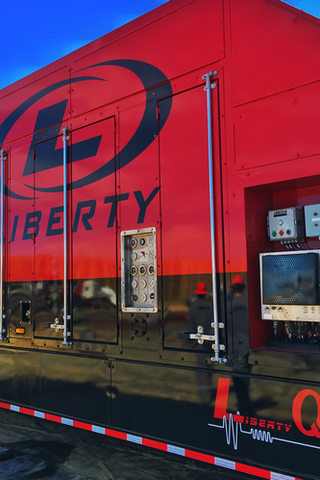Denver’s Liberty Oilfield Services Inc., which offers hydraulic fracturing services to oil and gas companies working in Colorado and elsewhere, said Tuesday that it’s resumed its push for an initial public offering.
The company, led by CEO Chris Wright, said it is offering 10,714,286 shares of Class A common stock at a price between $14 and $16 per share. Liberty said it’s authorized to use the New York Stock Exchange symbol of LBRT, subject to official notice of the issuance.
At $16 per share, the sale would raise $171.4 million.
It’s a smaller offering than Liberty’s planned IPO during the first half of 2017.
In April, the company said it planned to offer 22,857,143 shares of its Class A common stock, more than twice the number of shares currently on the table, at between $16 and $19 per share. If the plan had gone through, that could have raised at least $365.7 million.
The company in May postponed the IPO, after it had dropped the offering price to $12 to $13 per share.
The company has grown rapidly since its founding in Dec. 2011 — even through the industry downturn in 2014-16.
Liberty supplies equipment and crews used to hydraulically fracture, or frack, oil and gas wells using water, sand and chemicals. Oil and natural gas flow through the cracks in underground rock layers created by fracking and into the wells.
Liberty started with one fleet of hydraulic fracturing equipment to 19 fleets of equipment by the end of 2017. Three more fleets will be deployed by the end of June 2018, the company said in a filing with the U.S. Securities and Exchange commission.
During the industry downturn, due to a global glut of supply and correspondingly low commodity prices, the U.S. fracking sector shrank by at least 40 percent, Liberty said.
But in contrast, Liberty’s fleets were busy — with more than 95 percent of its capacity “active and deployed during this period,” the company said.
Liberty credited its ability to thrive during the downturn to “strong partnerships” with customers — relationships the company said it expects will continue as it continues to grow.
More than 90 percent of the oil and gas wells in the United States have been fracked, sending the nation’s production capacity soaring in the last decade.
Its customer roster, filed with the SEC, read like a who’s who of major independent oil and gas companies working in the region, including Denver-based Extraction Oil & Gas Inc., SM Energy Co., and PDC Energy. Also on the list are Noble Energy Inc. and Anadarko Petroleum Corp., the top energy companies working in Colorado. Liberty also said it works with Continental Resources Inc., Devon Energy Corp. and Newfield Exploration Co.
Liberty’s fleets work in the major oil and gas basins in the western U.S., including Colorado, Texas, Wyoming, Montana and North Dakota.
It also has been innovative in responding to social pressures in Colorado, as drilling rigs have moved closer to fast-growing communities in the last few years.
Liberty’s “Quiet Fleet” of fracking equipment cuts noise levels, compared to standard equipment.
The company said it’s financial figures for the fourth quarter 2017 aren’t yet final, but revenue for the quarter is expected to be about $445 million, up from $155.7 million during the fourth quarter 2016.
Net income for the quarter is expected to be between $54 million and $61 million, a swing from a net loss of $4.4 million during the last quarter of 2016, the company said in its filing.
